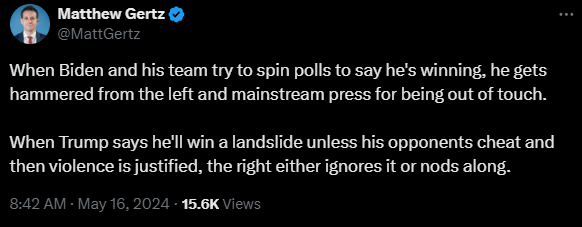A House GOP vibe check, per CNN’s Annie Grayer: “House Oversight Committee pushes back their [Merrick] Garland contempt markup to 8p tomorrow so GOP members have time to attend the Trump trial in NYC.”
Schlepping up I-95 to help criminal defendant Donald Trump get around a gag order by day, toiling away at the umpteenth fruitless attack against a member of Biden’s cabinet by night: Saving the country from the radical left sure is a full time job!
Thanks to everyone who came out to our D.C. event last night—it was great to meet a number of you out in meatspace. Happy Thursday.

What Comes After Rafah?
President Biden’s threats about pausing some “offensive weapons” to Israel notwithstanding, the IDF has continued its operations around Rafah this week as 400,000 Gazans flee the southern city.
Meanwhile, hostage negotiations continue to stagnate, as Hamas has calculated that they will survive Rafah. That’s an astute observation on Hamas’ part—because they will survive Rafah.
For the last month, as the world held its collective breath over the possibility of a “temporary ceasefire,” Hamas cleverly used its asymmetric advantages. First, they’ve released multiple “proof of life” hostage videos that exacerbated the hostage debate roiling Israel. Second, they “accepted” an alternative ceasefire proposal, which Israel quickly disavowed, a clever ruse that ruthlessly ginned up excitement throughout Israel. Hamas might be the smaller fighting force, but they have proven to be a brutally pragmatic terror state.
More importantly, Hamas’ delaying tactics have succeeded. They are reconstituting throughout the battlefield. While this reconstitution predates the Rafah operation, they have used the time and space to reorganize and refit, ensuring they survive the upcoming assault.
That doesn’t mean the Rafah operation shouldn’t take place. It should. It must. Hamas is not only a terrorist group; they are also an army. The last remaining battalions are dug into a complex series of tunnels throughout Rafah. These operations are proceeding much slower than the IDF prefers because of the Biden administration's increasingly stringent parameters.
After Rafah, part of the IDF will focus on fighting Hamas’ remnants. Netanyahu has said as much during a recent interview. The IDF must ensure that Hamas does not become a terror army again. In short, the fight will continue, but it is unlikely to reach levels of carnage seen in earlier operations.
Following Rafah, Netanyahu must also present the international community with a plan for who will govern Gaza. In his defense, there are no good options available. The Sunni Arab nations have repeatedly rebuffed requests for assistance. It will likely take months, if not years, for an organic political group to rise in Hamas’ ashes. Which group or clan wants to work with the IDF? How would anyone maintain any semblance of legitimacy working with the hated Jews?
This is why a population-centric counterinsurgency strategy, which was all the rage during the 2010s, would fail miserably in Gaza. In Iraq and Afghanistan, U.S. troops had varying degrees of goodwill with different parts of the population. While that somewhat dissipated throughout time, the United States was still a superpower, so there were economic incentives to work with American forces. However, in Gaza, antisemitism runs deep, especially after the last seven months.
That likely leaves the Palestinian Authority (PA) as the only viable option. Led by Holocaust denier Mahmoud Abbas, the PA is corrupt, weak, and ineffective, but it is the only option available unless a new player emerges. Netanyahu, who has been loath to work with the PA, should agree to a nebulous framework of talks with the PA to help Biden’s political flanks. That’s what a responsible partner would do.
Regardless, while Netanyahu’s base looks increasingly restive, he’s unlikely to leave office before the American elections, given that Israeli elections require a three-month campaign. Nevertheless, Netanyahu, like Trump, has been pronounced dead throughout his political career, only to rise again. Bibi probably likes his chances at being re-elected, as he can play himself off as a reasonable alternative to the hard-right’s maximalist demands and those “soft” on the two-state solution.
More importantly, Netanyahu must quickly turn his attention to northern Israel. Hundreds of thousands of internally displaced Israelis need to return to their homes along the border with Lebanon. Once the Rafah operation is complete, Netanyahu will pivot his gaze back to the north to get Israelis back inside their houses.
Netanyahu will insist that Hezbollah remove its forces behind the agreed-upon demilitarized zone above the Litani River. That’s why France and the Biden administration are working feverishly to enact some type of ceasefire between Hezbollah and Israel: because they know a war between Israel and Hezbollah would make the carnage in Gaza pale in comparison. But those talks will likely produce little until the Rafah operation concludes.
Thus, while all eyes turn to Rafah, this war will not end there, even if the IDF is wildly successful. It will continue in Gaza and the West Bank, and if Hezbollah doesn’t move behind the Litani River, it will spread to Lebanon, too.
—Will Selber
Did Michael Cohen Seal the Deal?
Michael Cohen’s testimony is in the books, and Donald Trump’s New York hush money/business records trial is hustling toward its conclusion. How much longer it will go will depend on how many witnesses the defense chooses to call—if any. But with the prosecution’s case laid out in full, it’s fair to start asking: Have they proved their case beyond a reasonable doubt?
Up at the site today, Philip Rotner argues that Cohen’s testimony got the prosecution over the bar—but “just barely.”
Prosecutors were able to establish most of the relevant facts of the case without the aid of Cohen’s testimony: The $130,000 that Cohen paid Daniels, the sham business account he used to do it, the chain of reimbursement and the way it was falsely recorded in Trump Organization records, the testimony of other witnesses that all this was to help Trump’s 2016 campaign, and Trump’s own signature on the reimbursement checks to Cohen.
“All that was left for Cohen was to provide the final nail in the coffin, evidence proving beyond a reasonable doubt that Trump personally and directly participated in the falsification of the Trump Organization’s business records,” Rotner writes. It isn’t enough that Trump’s company covered the trail—the jury must be convinced that “Trump himself made or caused the false entries to be made.”
Did they get there? Rotner writes:
I say that this testimony only “barely” closed the loop on Trump’s personal involvement in the false business entries because I was struck by the seeming hesitancy of the prosecutors to go in for the kill shot. They got Cohen to testify in very general terms about what took place during the Trump Tower meeting, but they never dug deeply to probe Cohen for the kind of specifics that would have wrapped it into a neat package: Did you and Weisselberg specifically discuss with Trump that the reimbursements were going to be falsely recorded in the company’s records as legal expenses? Is that what Trump approved? Did you discuss why the payments had to be grossed up? Was there any discussion of a retainer agreement for legal services?
There are any number of ways the prosecutors might have phrased questions calculated to elicit the kind of devastating, unambiguous testimony that would have laid waste to Trump’s defense, but they didn’t go there. There’s still a remote possibility of additional testimony from Cohen providing more detail about the Trump Tower meeting. Although his direct examination is finished, Cohen is still on the witness stand. If, on cross-examination, Trump’s attorneys reopen testimony about the meeting, they could blunder into eliciting more harmful testimony, or they could open the door for the prosecution to do so on redirect. But absent that, this looks like a missed opportunity for the prosecution . . .
Whatever the reason, I can’t escape the uneasy feeling that they missed an opportunity to seal the deal with the jury, especially since the jurors apparently won’t be told why the only other witness who was in the room at the critical time, Allen Weisselberg, won’t be testifying at the trial.
Catching up . . .
Temporary pier is anchored in Gaza to deliver aid, U.S. military says: New York Times
Netanyahu rejects U.S. calls for postwar plan in Gaza: Wall Street Journal
Biden and Trump, trading barbs, agree to two presidential debates, in June and September: AP News
Biden asserts executive privilege over recordings of special counsel interview: Wall Street Journal
Sen. Mitt Romney says Biden should have pardoned Trump: NBC News
Republicans flock to court to ‘kiss the ring’ during Trump criminal trial: Washington Post
House Ethics panel subpoenas DOJ for Gaetz records: Politico
Quick Hits
Over at the Atlantic, Yair Rosenberg writes on how Israel’s defense establishment—like the U.S.—is starting to publicly pressure Prime Minister Benjamin Netanyahu on his failure to propose a postwar plan for Gaza:
On Tuesday, Daniel Hagari, the chief spokesperson for the Israel Defense Forces, did something extraordinary: He criticized the Israeli government. In recent days, Israeli troops have battled Hamas in parts of northern Gaza that had previously been cleared of enemy combatants. A reporter asked Hagari if the terrorist group had been able to reassert itself because the Israeli government had not set up any non-Hamas Palestinian administration for those areas.
The spokesman could have dodged the question. He did not. “There is no doubt that a governmental alternative to Hamas will create pressure on Hamas,” he replied, “but that is a question for the political echelon.”
Hagari’s polite but pointed critique of Israel’s leadership was a pebble. The avalanche came the next day. In a televised address yesterday, Defense Minister Yoav Gallant—a former general and current member of Benjamin Netanyahu’s Likud party—publicly rebuked the government for failing to establish a postwar plan for Gaza. He then demanded that Netanyahu personally commit to Palestinian governance for the enclave, as opposed to Israeli settlement or occupation.
“Since October, I have been raising this issue consistently in the cabinet, and have received no response,” Gallant said. “The end of the military campaign must come together with political action. The ‘day after Hamas’ will only be achieved with Palestinian entities taking control of Gaza, accompanied by international actors, establishing a governing alternative to Hamas’s rule.”
Without such a political strategy, Gallant argued, no military strategy can succeed, and Israel will be left occupying Gaza and fighting a never-ending counterinsurgency against Hamas that saps the country’s military, economic, and diplomatic resources. “Indecision is, in essence, a decision,” he said. “This leads to a dangerous course, which promotes the idea of Israeli military and civilian governance in Gaza. This is a negative and dangerous option for the state of Israel.”
The defense minister closed with an ultimatum: “I call on Prime Minister Benjamin Netanyahu to make a decision and declare that Israel will not establish civilian control over the Gaza Strip, that Israel will not establish military governance in the Gaza Strip, and that a governing alternative to Hamas in the Gaza Strip will be raised immediately.” With these words, the Israeli defense establishment effectively launched a revolt against the Netanyahu government—and the dreams of its far-right flank to flood Gaza with Israeli settlers.







This is really really bad, with current tensions, with a threat to a israel PM who might be booted from office, there will be views from many , that Bibi ordered this, to push for wider war with iran [shudders] - https://www.telegraph.co.uk/world-news/2024/05/19/helicopter-carrying-iran-president-ebrahim-raisi-hard-land/ This is really bad, particularly in Azerbaijan where they are allied to israel and receive weapons with a Israel PM in trouble, who would profit with a war with iran , which would push the west to defend israel :( equally it could be said, some hardliners in iran could have set this up but to do the same, from the otherside....equally it could just be accident in heavy fog....but will Iran accept the crash investigators findings from Azerbaijan/ i think so....another headache for the world, even if this is just a innocent accident, the connotations are extra frightening :(
I know nobody's paying attention now - it's Saturday evening - least of all the writers (I say this because unlike JVL they don't respond to comments), but the "repeatedly rebuffed" link in this statement, "a plan for who will govern Gaza . . . the Sunni Arab nations have repeatedly rebuffed requests for assistance", has nothing to do with the plans for post-war Gaza. And it's not even current. Bad linking, dear Bulwark.
I very much want to know about the proposals to have the Sunni Arabs play a role in post-war Gaza. Can you address this in next week's Morning Shots?